- 19 Best Cinder Block Fire Pit Ideas to Step Up Your Backyard - August 1, 2022
- The Best Front Porch Flower Ideas to Get You Inspired - July 5, 2022
- How to Find the Best Patio Heaters For Your Home - May 31, 2022
Sorting through the best porch flooring options is no easy feat. The sheer number of factors to consider (from materials and styles to colors) is enough to overwhelm anyone. Add to that the different types of porch flooring, and you’ll begin to see just how dire things can get.
So, to help your hunt, I’ve created a rundown of flooring options that’ll add radiance and beauty to any home. I’ve also included several guides that should help you make an educated decision. Let’s take a look at the best porch flooring options!
Bottom Line Upfront
As a parent of two rambunctious littles and a big bulldog, I love the durability of the Mammoth Acacia Wood Deck Tiles. They just make sense for my home and lifestyle. Plus, super easy to install!
Top 3 Picks
I love starting my guides on a high note. So I’ve got my top 3 picks for the best porch flooring options. We’ll take a deeper look at what the products have to offer later on in the guide.
Best overall: We Sell’s Wood Grain Mats
These foam mats will fit seamlessly onto any hard surface and award a finished look to the porch.
Most Durable: Mammoth Acacia Wood Deck Tiles
Made from sustainably sourced teak and acacia wood, these deck tiles can last decades if well taken care of.
Best Bargain: PANDAHOME Wood Composite Deck Tiles
To make these tiles efficient and affordable, they’re made of composite plastics that have been designed to look like wood. They even look as lovely as natural wood.
What is Porch Flooring?
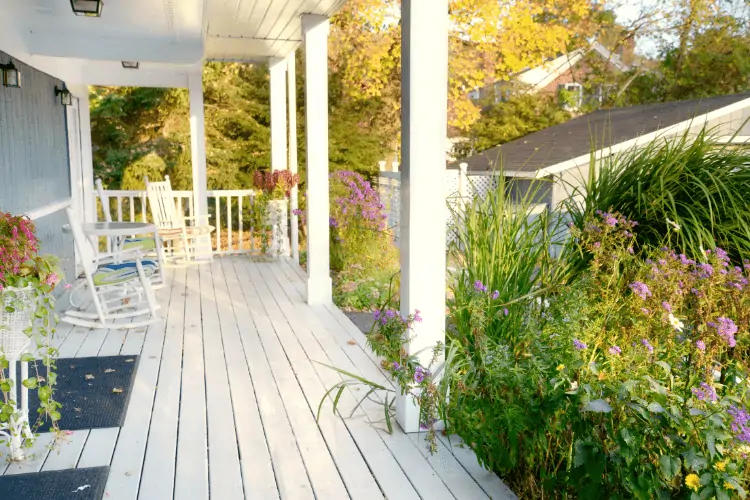
Porch Flooring refers to the process of applying finish materials over a porch’s floor structure to provide a walking surface. Correspondingly, porch flooring could also refer to the boards or other material of which a porch floor is made.
Do You Really Need Porch Flooring?
It’s okay to try and cling to the dream of owning your current flooring forever, but nothing lasts that long. So, if you noticed any of the following with your porch floor, it’s time to take the leap.
Allergies
Has anyone in your home been struggling with allergies despite doing everything in your power to prevent them? The culprit could be lying right under your feet. Mold, pollen, dust, and even Volatile Organic Compounds have been known to make camp in some porch flooring options.
So, if you suspect any of the above may be stuck on your porch floor, it’s time to make replacements.
Peeling Vinyl and Laminate Flooring
Vinyl and laminate are great porch flooring options. That said, after years of exposure and water damage, expect your vinyl floors to start ‘peeling.’ I’ve seen it happen so many times. Even worse, this issue has no straightforward fix, and more often than not, you’ll need to replace the entire floor.
Similarly, you’ll need to replace these floors if they begin to stick up or peak where the floors meet. This usually signifies a lack of expansion space, and doing nothing will only cause the floor to deteriorate further.
Your Current Porch Flooring is Out of Date
There is no shame in needing a new porch floor because your current one is out of style. Or perhaps it’s just old, and you’d like a change. Whatever the reason, there are porch flooring options that’ll meet anyone’s personal preferences.
More on the different types in the next section.
Done With Hardwood Floors
Hardwood porch floors are stunning and will last decades with proper care and maintenance. Better yet, when your hardwood floor becomes faded or scratched, you can simply sand it down and refinish it. That’s usually sufficient to bring it back to life.
Unfortunately, sanding also reduces the quality of your hardwood floor. Usually, you can only carry out four to five treatments before your floor needs to be replaced. Other reasons your hardwood flooring could need a replacement include peeling and unevenness in some areas.
Unpleasant Odors
Once funny smells start getting through your porch’s sub-floor, you need a replacement. If the smell is caused by pet urine, pets, and such, you’ll also need to clean the subfloor thoroughly. Once you’re done, pick a porch floor replacement that can withstand whatever caused the odor.
A Noisy Floor
A noisy floorboard is typically the first sign of flooring damage. Worse yet, if your porch’s flooring is older, it may signal a deeper issue needing immediate action.
If the issue is as simple as a loose nail, all you need is a quick repair. However, if the underlying issue is worse (like widespread rotting), you need new porch flooring. For example, we just had to replace our porch floor because we had no idea about previous water damage.
See also: Ultimate Farmhouse Decor Ideas
Different Types of Porch Flooring
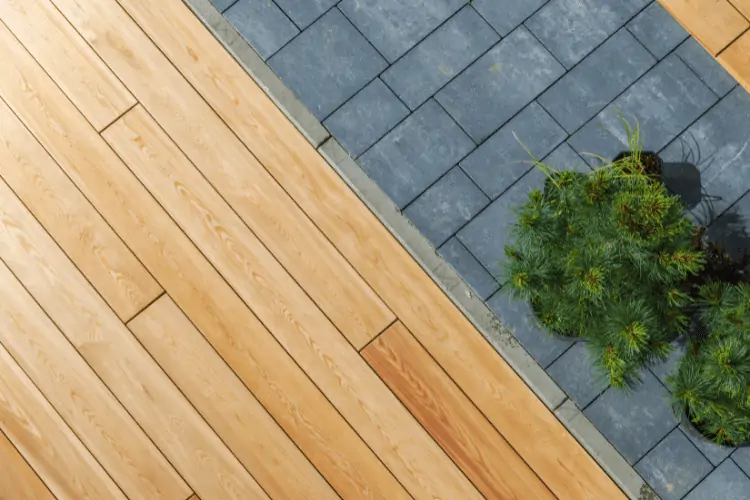
Now we’re going to talk about the different types of porch flooring options available today. There are tons of options out there, but I feel these are the best.
Rubber Porch Flooring
Rubber porch floors are made from high-density polyethylene (usually a mix of recycled tires and polyethylene resins.) This strong build allows them to withstand even the most extreme temperature variations.
It’s easy to find rubber porch flooring in various styles and colors, including terra-cotta, green, and more. Rubber floors are also durable and can last over 25 years with proper care and maintenance.
Pros
- Low maintenance
- Eco friendly and can be recycled
- Hypoallergenic and anti-microbial
- You won’t need to worry about repairs
- Good insulation
Cons
- Dull finish
- Grease could leave stains
PVC Porch Flooring
Highly durable, PVC (plastic) porch flooring is an environmentally safe option used by homeowners as well as commercial architects. Often, plastic porch floors are made to resemble either finished or unpainted wood flooring.
What’s more? Plastic porch flooring won’t twist or rot and will only need periodic maintenance.
Pros
- UV stable
- Drain water effectively
- Mildew and Mold resistant
- Slip Resistant
- Affordable option
Cons
- Not a comfortable option
Brick Porch Flooring
When installed correctly and properly maintained, brick porch floors can last decades (if not lifetimes.) You also won’t have to worry about slipperiness with brick porch floors. Bricks are naturally slip-resistant.
Another distinctive feature of bricks is they get slightly worn with time or age. When that happens, it’ll add even more personality and character to your porch floor. Trust me!
Pros
- Naturally stay warm
- Environmentally conscious
- Slip-resistant
- No maintenance required
- Looks great
- Affordable in the long term
- Very durable
Cons
- Water retention is an issue
- Difficult to replace
Foam Porch Flooring
Most experts recommend foam porch flooring because this material is soft, durable, non-porous, water, and slip-resistant. If you have children like me, these features will make your porch a safe, comfy area in which they can play.
Additional features of foam porch flooring are that it can be mold/mildew resistant, non-toxic, anti-fungal, and anti-bacterial.
Pros
- Easy to maintain
- Anti-fungal and Anti-bacterial
- Non-toxic
- Mildew and mold resistant
- Soft and cushiony
Cons
- Not the most durable
Vinyl Porch Flooring
Ideal for both residential and commercial applications, vinyl porch floors are versatile, low in maintenance, and easy to install. Vinyl porch flooring also comes in two primary forms, heterogeneous and homogenous flooring.
Both types of vinyl porch flooring are affordable and highly stain resistant.
Pros
- Comfortable
- Resilient
- Affordable
- Easy installation
- It stands up well to the elements
Cons
- It cannot be refinished
Wood Porch Flooring
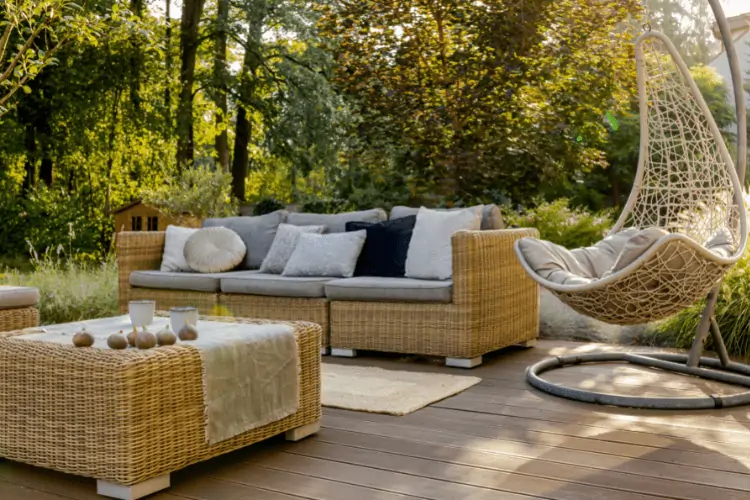
If I were to judge porch flooring options in terms of popularity, then wood porch floors reign supreme. Wood porch floors are stylish and ooze longevity. With proper maintenance, they can last decades.
The downside is that wood requires extra care and attention compared to all other flooring options. Why? Because it’s more susceptible to rotting. That’s why some people go for composite porch flooring instead.
Composite wood is a material made from a mixture of plastics and wood particles. It boasts a wood-like look and is also highly durable.
Pros
- A great selection of looks is available
- Very durable
- Eco-friendly option
- Heat and frost won’t be an issue
- Spills are easy to deal with
Cons
- Deteriorates quickly if improperly maintained
- It doesn’t stand up well against moisture
Concrete Porch Flooring
Concrete patio flooring should be your first pick if you crave strength, versatility, and durability. If you dislike the “blank” look of canvas, feel free to get creative. Your options include painting or staining the concrete until it looks like tiles, stone, or even wood.
Concrete patio flooring is also the best at weathering the elements, however harsh. I mostly love that it’s super cheap!
Pros
- A more affordable option
- A wide variety of styling options are available
- Awards you a rustic feel
- Durable and strong
- Excellent at dealing with exposure to the elements
Cons
- No cushioning
- Color will change over time after constant exposure
Natural Stone Porch Flooring
Natural stone porch flooring looks classic and is one of the most durable options available. You can expect it to outlive you by decades.
One of the most significant drawbacks of natural stone floors is they get slippery when wet. They’re also hard, unforgiving surfaces to fall on and can be pricey (depending on the stone you pick.)
Pros
- Slip-resistant
- Durable
- Sturdy
- Delivers a touch of beauty and ambiance
Cons
- Painful to fall on
- Hard to replace if one stone chips away
Tile Porch Flooring
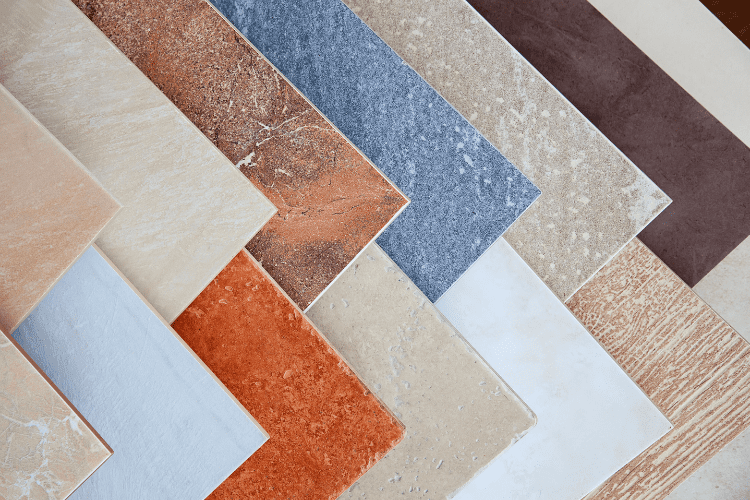
Nothing is more gorgeous than classic stone or wood porch tiles, right? Well, I have a secret for you. Most of the “wood” and “stone” porch floors you see around aren’t really wood or stone, but tiles.
Better yet, tiles porch flooring is often more durable than natural materials like wood and stone. Of course, that’ll depend on the PEI rating of the tiles you acquire.
Pros
- Easy to put together and pull apart
- Cushiony and comfortable
- Affordable
- Choose from tons of styles and colors
Cons
- Longevity
What To Look for In Porch Flooring
The best porch flooring options are classified as the best for a reason. Here are some of those reasons.
Sound Insulation
Any great flooring material should be a good sound insulator. The last thing you want is a porch floor that makes noises when you walk. Examples of good sound insulators include rubber, cork, and timber.
Thermal Insulation
Only spend your hard-earned dollars on a flooring material with good thermal resistance. Examples include rubber, cork, asphalt, and PVC.
Pet-Friendliness
Do you have pets that’ll be sharing your porch with you? Then finding a porch flooring better suited for their activities will be paramount. For instance, most vinyl floors are waterproof and scratch-resistant, making them a top option for dog owners.
A pet-friendly porch flooring option should also be slip-resistant.
Maintenance
A good porch flooring option should require the least maintenance. It shouldn’t allow dust to settle on or in it. And in cases of repairs, they should be easily treatable at an affordable price. Porch flooring materials that require the least maintenance include marble, concrete, and stone.
Slipperiness
Ensure the porch flooring doesn’t have an uber-smooth surface that gets slippery even when wet. Even the most over-polished flooring materials have been coated with anti-slippery solutions to protect your loved ones.
Ease of Cleanliness
Speaking from personal experience, you’ll need a porch floor that’s easy to clean. The material you pick should neither allow stains to form on it nor absorb any solutions like grease and oil.
Leveled Out
The material’s top surface should be smoothed and leveled out. Rough surfaces aren’t cute to look at on a porch. An uneven floor can also damage the bases of equipment you’ve placed on said floor.
Hardness
The floor material you go for should be sufficiently hard to resist wear and tear caused by heavy loads.
Best Value for Money
Different porch floor options have different price ranges. Whichever material you pick, just make sure it’s the most reliable and effective in its price range.
Aesthetics
Chances are that your porch is a focal point of your home. As such, you’ll need a flooring material that can deliver your desired look, be it marble or terrazzo. Also, consider going for materials that retail in different sizes, designs, shapes, and colors.
The Best Porch Flooring Options
So that’s what you should look for in the best porch flooring options. Next up, here are 8 top-rated deck tiles. I chose these based on their overall durability, ease of installation, and style.
We Sell Wood Grain Mats
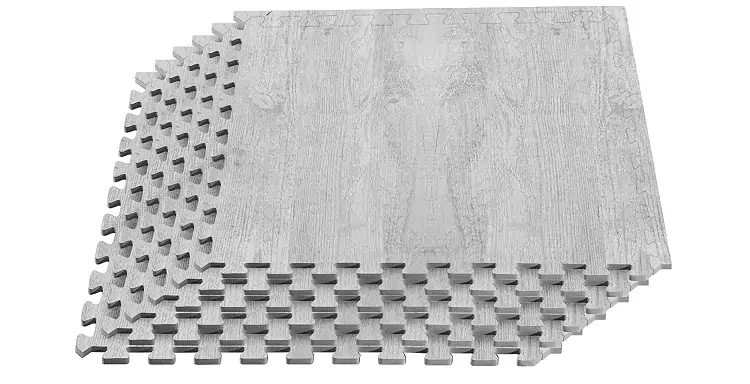
Best Overall
With We Sell’s Wood Grain Mats, you can pick from four distinct size options. You can use these to cover areas as large as 100 square feet or as small as 24 square feet. Better yet, you’ll get to choose from a wide assortment of faux wood styles and colors.
We Sell’s Wood Grain Mats are also extremely easy to set up and remove. You simply slide the pieces together and press the connecting parts into place. Besides your porch, you can also set these up in areas like your office or kitchen for a comfortable workspace.
Pros
- 3/8-inches thick to provide plenty of cushioning
- Detachable border pieces eliminate jagged edges
- Extremely versatile
- Easy to store and set up
- Retails in several styles and color varieties
- It will make your porch look super polished
Cons
- Apparently scratches easily
PANDAHOME Wood Composite Deck Tiles
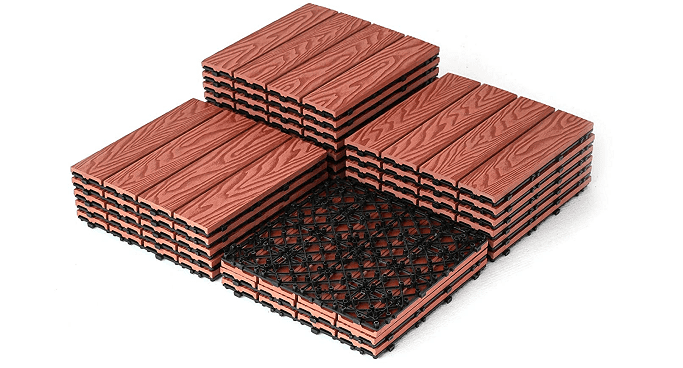
Best Bargain
Are you scouring the internet looking for an affordable, weather-resistant, and durable porch flooring option that’ll provide perfect coverage? In my opinion, these Pandahome Wood Composite Deck Tiles are excellent choices you should consider.
Because they’re made of composite plastic, these tiles are waterproof and can withstand the harshest conditions. Pandahome has also fitted them with drainage channels. And unlike natural wood, they won’t warp, bend, or crack due to moisture and high temperatures.
Pros
- Feature drainage channels
- Weather-resistant
- Superior durability
- Easy to snap together
- Cost-effective
Cons
- Their color may fade over time
Mammoth Acacia Wood Deck Tiles
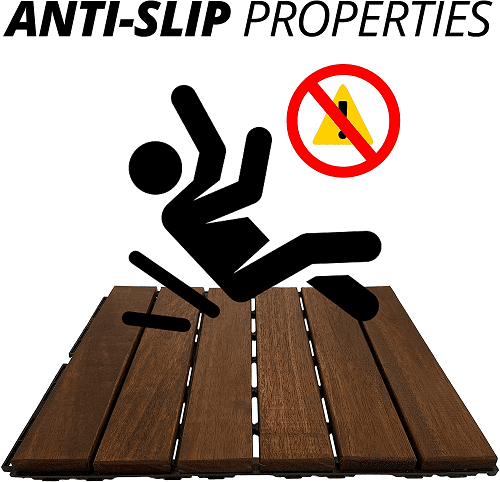
https://www.amazon.com/Mammoth-Interlocking-Resistant-Composite-Flooring/dp/B07H9SDGQP
Most Durable
I love Mammoth Acacia Wood Deck Tiles‘ UPS (unique selling proposition) because they’re sustainably sourced tiles. So, you can rest assured you’re not killing the plant while on your quest for the best porch flooring options.
What’s more? These Mammoth Acacia Wood Deck Tiles are adorable. They all boast a natural, unfinished teak color and small slats that run in the same direction. The fact their shade is unfinished assures you it’ll never fade.
Pros
- Easy to put together and take apart
- You can oil them to improve durability
- Minimal maintenance required
- Water-resistant
- A drainage space included underneath
Cons
- A bit more force is required to snap tiles together
- Not the most weather resistant
Pure Era Stone Deck Tiles
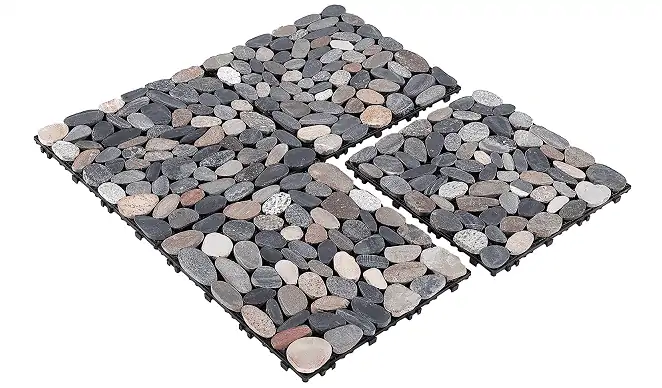
Best Contender
If these Pure Era Stone Deck Tiles hit the spot for you, you’ll be pleased to learn about their versatility. Besides porches, these tiles are also ideal for everything from your garden and bathroom to your pathway and gazebo.
To ensure they’re practical for wet areas like your pool deck and bathrooms, Pure Era made them waterproof and slip-resistant. You can take them apart easily and put them back together when it’s time to clean the floor underneath. To me, that’s so handy!
Pros
- Water-resistant
- Maintenance-free
- Extremely versatile
- Easy to assemble (no tools required)
- Durable
Cons
- The stones do not cover the tiles’ connection lines
- Some stones may have glue residue on their tops
Behr Premium Porch & Patio Floor Paint
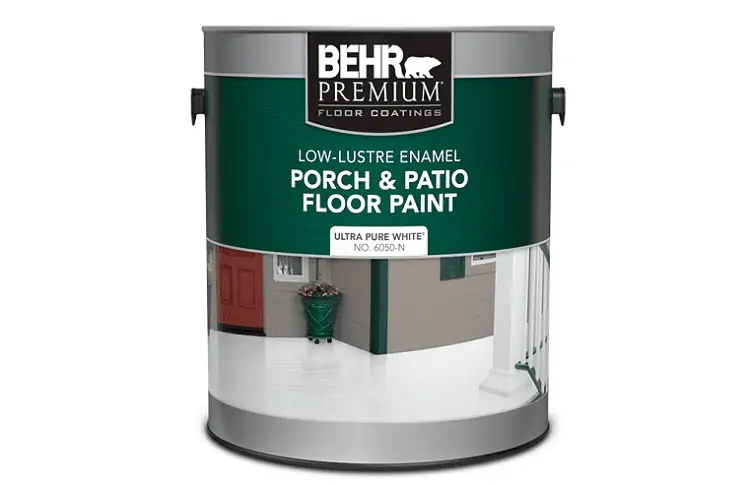
Honorable Mention
You can use this 100 percent acrylic paint on both concrete and wooden porch flooring options. Just make sure you clean the wooden deck or peel out its old paint before applying Behr Premium. Behr also suggests using a primer beforehand.
Another feature of the Behr Premium Porch Floor Paint worth noting is it boasts a waterproof and slip-resistant finish. Do not use this on areas subject to automotive tires.
Pros
- Mildew resistant
- It can be used on both exterior and interior surfaces
- Durable
- Backed by one year warranty
Cons
- Not for use on garage floors
Winston Brands Interlocking Patio Tile
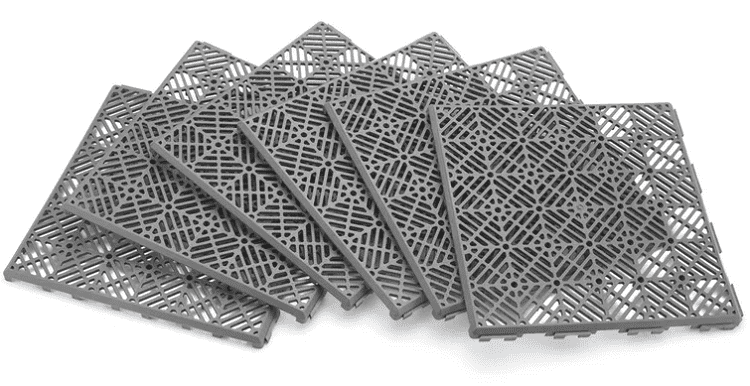
Best for Drainage
Are you after a porch flooring option best for drainage? These Winston Brands Interlocking Patio Tiles with openwork patterns (as shown in the image above) could be the answer. The tiles are also non-slip and weather-resistant, making them perfect for exposed porches.
Each set of Winston Brands’ Interlocking Patio Tiles covers 3 x 2 ft., and you get six in each pack. As far as installation, you simply need to click them together. And if you don’t plan on seasonally taking them apart, feel free to glue them to the floor.
Pros
- Slip-resistant
- Easy to install and take apart
- Effective water drainage
- Great for indoor and outdoor use
- Comfortable to walk on
Cons
- The plastic is fragile
- It needs a bit of force to snap together
MSI Montauk Black Slate Tile
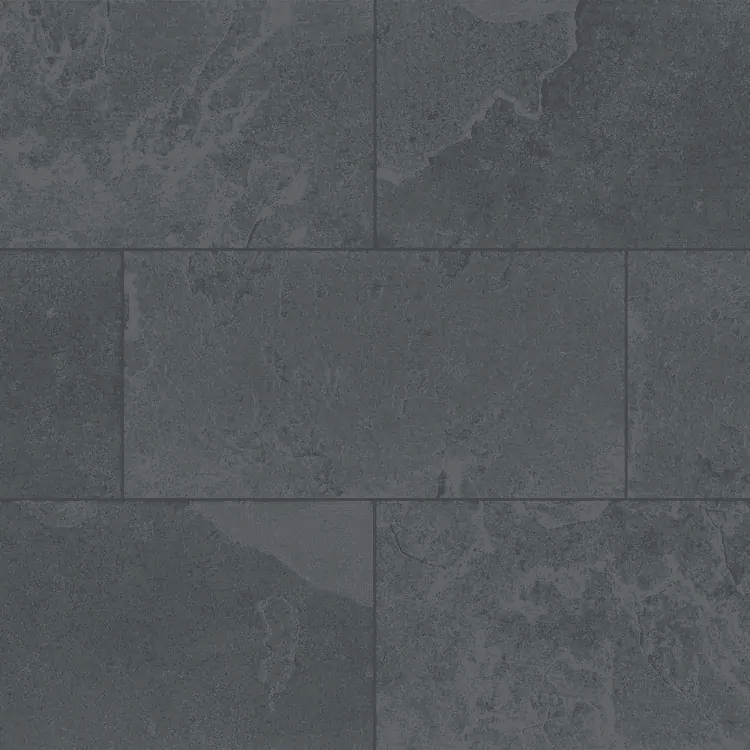
Most User-Friendly
MSI Montauk Black Slate Tiles are available in honed, gauged, and natural finishes to accommodate everyone’s personal preferences. Note, though, that the honed variety is only available for the 16 x 16 and 12 x 12 sizes.
Over the first few months after installation, you’ll need to clean your new floor at least once every two days. Why? Because the tiles may go through a process called “spalling” (which is normal, by the way.) Spalling means that small pieces may keep flaking off the tiles’ surfaces.
Pros
- Retails in a wide array of sizes
- Easy to clean and put in place
- Durable aesthetic
- Great drainage
- It doesn’t fade over time
Cons
- Annual sealing is required to aid in water repellency
- Some people aren’t fans of spalling
RevTime Rubber Paver
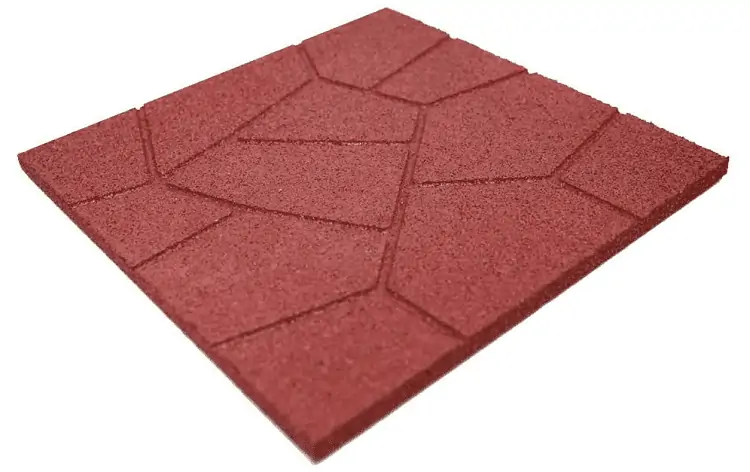
Best for Harsh Weather
This porch flooring option from RevTime is a great multi-purpose option. It’s made from heavy-duty rubber granules and is grooved at the bottom to keep water off the surface. The rubber also makes the tiles anti-static, anti-slip, and durable.
Lighter than traditional stone, these rubber pavers are tough and well-built to sit outside any time of the year. That implies you can use them on lawns, gardens, barbecue areas, and motor homes (in addition to your porch.)
Pros
- The red shade will add a pop to any setting
- Very versatile
- Slip-resistant
- Long-lasting
- Provides enough traction
Cons
- Expensive
FAQs
Answer: If you’re looking for an option that’ll last the life of your house, try concrete flooring. If the porch is over a basement and is several steps off the ground, go with a wooden porch instead.
Answer: If you live with a lot of moisture or rain, try one of the tropical hardwoods. These denser and harder woods wear well and are incredibly durable.
Answer: The best wood for a front porch is classic wood. The material’s beauty is it comes from nature, and it’s renewable, strong, and fairly easy to put together.
Answer: The best flooring options for a balcony are traditional wood and concrete. Both of these are durable and easy to maintain.
In the End
And that’s it! The ultimate guide to the best porch flooring options. Your eventual choice will depend on your personal preferences and the number of conditions you’d like the floor to withstand.
But if you want something stylish, easy to install, and super durable, I strongly recommend the Mammoth Acacia Wood Deck Tiles. And, if you’re just totally unsure, chat with a local flooring expert. For more great recs like these, check out our website.
Recommended Reads:

